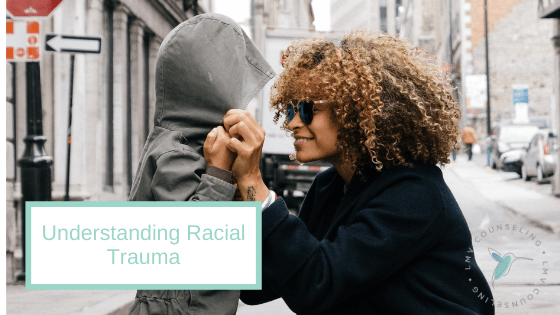Racial Trauma
Racial trauma, or race-based traumatic stress is the cumulative negative effects of racism and discrimination on the mental and physical health of people of color. Events that may cause racial trauma can be overt or covert Often they that may be in the form of microaggressions, threat of harm or injury due to race, hate crimes, witnessing killings of people, of color police brutality and other traumatic events. In the United States Black, Indigenous People of Color (BIPOC) are most at risk for racial trauma due to living under a system of white supremacy.
Experiences of race-based discrimination can have psychological impacts on individuals and their wider communities. In some individuals, prolonged incidents of racism can lead to symptoms like those experienced with post-traumatic stress disorder. Racial based trauma stress is a mental injury that can occur as the result of living within a racist system or experiencing events of racism.

Examples of Race-Based Traumatic Stress
Racial trauma can be an overt action from another person or can be experienced within a wider system. Trauma can also be experienced vicariously like learning about events from a family member or watching videos of people facing racism. The examples below do not include all examples, they are a small sampling of examples.
- Learning about and watching the video of brutal police killings, such as George Floyd’s murder
- Witnessing higher rates or homicide, suicide, or unintentional injury
- Told to “go back to where you came from”, called a racial slur, or treated unfairly by others
- Promotion of anti-Semitic symbols and slurs by the media and political leadership
- Disproportionate policing, arrests, and sentencing in the criminal justice system
- Facing barriers to acquire capital to start a business or home ownership due to inequitable policies

What are the symptoms of Racial Trauma, or Race-Based Traumatic Stress?
Symptoms that may be experienced by people of color, who have been impacted by racial trauma include depression, anxiety, fear, anger, low self-esteem, irritability, hypervigilance, and suspicion. The fight or flight system is triggered when BIPOC individuals come in contact with any form of racism. The nervous system responds by attempting to survive in whatever way possible. Racial trauma can also have a negative impact on one’s physical health, including symptoms of hypertension and coronary heart disease.
Healing can be a process after being exposed to repeated acts of racism, discrimination and injustices. Racial trauma is unique in that there will be continued exposure to the traumatic event. Some ways to cope with racial trauma are to first become mindful of your energy level and emotional well-being. Check in with yourself to determine if you need to calm your nervous system.
Self Care vs Self Soothing
Make a regular habit of checking in with yourself. How are you? Not in the “I’m fine how are you?,” but in the real searching honest answer “how are you?” Journaling, prayer, and talking with a trusted person can be effective for helping you become more aware about your emotions and physical well being. From there you will take a two pronged strategy.

1. Self Soothing
Self-soothing is often mistaken for self-care. Self-soothing are activities to participate in once you’ve identified that you are knocked out of your zone. This activities are meant to calm your nervous system and help you relax. Here are some self-soothing ideas:
- Go for a run
- Pet your dog
- Cook something special
- Get a long meaningful hug from a loved one
- Engage in mindful play with your children
- Take your shoes off and feel the ground on your feet. Participate in feeling rooted to the earth.
- Color
- Take a nap
- Stretch your body or do yoga
- Meditate or pray
2. Self Care
Self-care is the active participation in decreasing risks that fire up your nervous system. This may mean changing people, places or things in your life that are toxic or triggering. Or perhaps just lessening the impact of these events. Examples of self-care activities include:
- Limiting your news intake
- Checking in with your ability to handle upsetting news at this time
- Connecting a therapist that can help you walk through your healing
- Advocate for equity and become involved in anti-racist change
- Introduce daily activities that calm your nervous system like exercise and meditation
- Nourish your body with foods that increase your energy level
- Protect your sleep and aim for at least 8 hours every night
At LMV Counseling, we condemn all forms of racism, discrimination, violence, and hate. We will continue to provide a safe, supportive space for all. We encourage the difficult conversations. You can meet with one of our trusted therapists either online or in person. Get Started Now.
Like what you’ve seen? We’ve got more!
Want to learn more? Curated tips delivered to your inbox:

